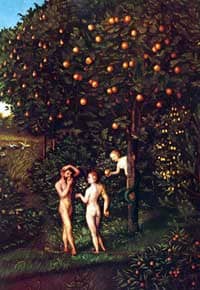Painting of the Garden of Eden by Lucas Cranach
 The Protestant tradition has historically taken the sinful nature of humanity very seriously, even though now, I venture to guess, many people prefer to think of themselves as basically good. But it is worthwhile to explore the theological meaning of sin, and especially of "original sin," the notion that we are all in some way inherently flawed creatures.
The Protestant tradition has historically taken the sinful nature of humanity very seriously, even though now, I venture to guess, many people prefer to think of themselves as basically good. But it is worthwhile to explore the theological meaning of sin, and especially of "original sin," the notion that we are all in some way inherently flawed creatures.
Original sin is a description of the human condition. Often, reflection on original sin takes place in the context of the story of Adam, Eve, and the serpent. Still, there are many ways to interpret exactly what the sin they committed consisted of, and how it continues to be present in the human condition. So, let's try a thought experiment -- a few different ways to think about what was going on when Eve took the "apple" and bit.1
In this primitive and basic story about the relationship between God and humanity, what do we learn about human separation from or rebellion against God? Some possible answers:
1) The perceived distance between Adam and Eve and God created such a longing for reunion with God that the serpent's promise of becoming like God was seen as a solution to this longing. Adam and Eve sought to return to God. The human condition, then, is one of constant longing for God, which can never be fulfilled in this life because while eating of the Tree of Knowledge did give Adam and Eve an awareness of good and evil, it did not bring them closer to God. Thus the condition of original sin is simply separation from God and our inability to heal that divide on our own.
2) Adam and Eve were inherently sinful and rebellious and therefore chose to flagrantly disobey God's command not to eat the fruit of the tree. The human condition is one of active rebellion, and humanity is in constant need of forgiveness and redemption. Adam and Eve hid from God to hide their own guilt. Original sin in this description is the overt desire for evil.
3) Adam and Eve desired to live a life on their own terms, and to create a good world for themselves, and so sought the fruit from the Tree of Knowledge of Good and Evil so that they would have the resources to create their own good world. The human condition is one of struggle for the good life, and sin is the fault of thinking we can do this on our own without God's constant assistance. This is the classic description of original sin as pride in our own capacities.
4) Rather than an expression of human depravity, or the prideful desire to build one's own world, this story represents humanity's emptiness and constant search for fulfillment. Adam and Eve were searching for meaning, tried to find that meaning in the serpent's direction, and hid from God not because of a feeling of guilt or shame, but a feeling of nakedness or nothingness. Humanity is constantly in search of meaning and knowledge. Original sin in this context is a lack.
5) Adam and Eve were the victims of the serpent, deceived by evil. The human condition is a constant struggle against evil and suffering. We are at the mercy of forces that are beyond our comprehension. Evil is external to us, and original sin is our susceptibility to that evil.
Each of these ways of interpreting what is going on in the story of Adam and Eve creates a certain theological world in which all other doctrines must make sense, such as the doctrines of creation, providence, grace, and salvation. Is the world primarily a mystery waiting to be understood, a battle of good and evil, a place for our own self-fulfillment, a project for us to complete, or a path from guilt to redemption? There is a particular understanding of human nature, an understanding of good and evil, an understanding of what we need from God, and an understanding of what salvation looks like for each of these different interpretations. Which do you think best describes the human condition?
1 This sketch of different theological worlds relies in part on W. Paul Jones, Theological Worlds (Nashville: Abingdon Press, 1989).
7/24/2009 4:00:00 AM




